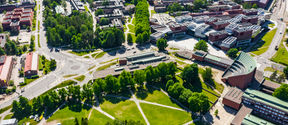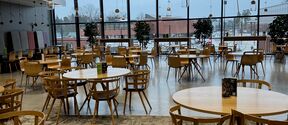The design guidelines for Otaniemi campus outdoor areas
The design guidelines aim to develop outdoor environments that support the university's activities as well as the wellbeing of nature and people.

At the Otaniemi campus, outdoor areas are managed with various meadow plants to support the area's biodiversity. Established as new habitats, the meadows have their natural origins in traditional Finnish landscapes, such as rock outcrops or scorched meadows. Meadows provide habitat for various plant and animal species, including many rare butterflies and other insects. Meadow areas are not only visually beautiful and culturally and historically valuable traditional landscapes but are also essential for many endangered species, including many pollinators. Pollinators, which need a wide variety of food throughout the growing season, are particularly dependent on the vegetation of the multi-species grasslands.

Finnish wild plants are an essential part of the diversity of our meadows and our landscape heritage. Although the flora of dry meadows and meadows is naturally endemic in Finland, their conservation requires protection and management of the habitats. Many meadow plant species are threatened by habitat loss and afforestation, as well as competition from invasive species.
On campus, invasive species control has been carried out this spring, including Japanese tataract, giant ragweed and lupine. Meadows are forming for example near of the Dipoli.

Pollinators are vital to the functioning of the whole ecosystem. Their importance for plant reproduction, crop production and even human food production is irreplaceable. However, pollinator populations have collapsed in many places due to habitat loss and other factors.
Creating and maintaining pollinator-friendly habitats is a key measure to safeguard biodiversity and the functioning of the ecosystem as a whole. On campus, this has been considered by favouring multi-species environments and providing nesting sites for wild pollinators. In addition, the timing and frequency of mowing in grassland, for example, is regulated to allow flowering plants sufficient time to produce seeds and provide food.

The design guidelines aim to develop outdoor environments that support the university's activities as well as the wellbeing of nature and people.

One Euro for Every Student project culminated in a planting workshop in mid-May on the new garden benches



